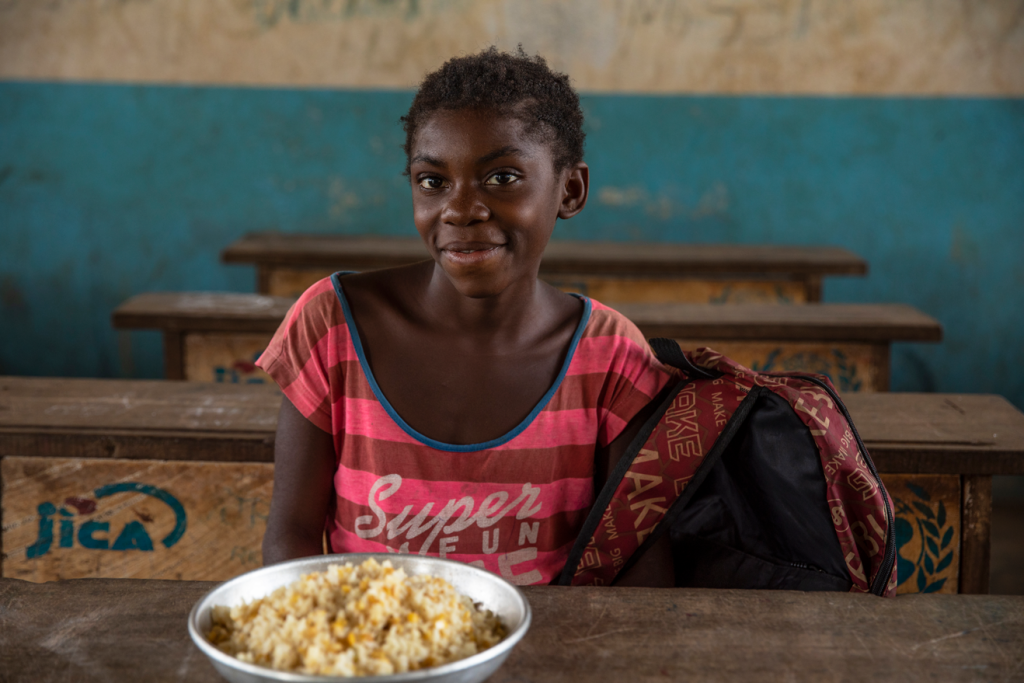 © WFP/Gabriela Vivacqua
© WFP/Gabriela Vivacqua
On February 20, 2025, the Government of the Republic of Congo officially signed its national commitment to the Global School Meals Coalition, joining Brazil and more than 100 member countries and 140 partners worldwide.
Joining the coalition reinforces the Congolese government’s commitment to developing policies that ensure school meals are available for children. Since 2023, the two countries, with the support of the WFP Centre of Excellence against Hunger in Brazil and the WFP of the Republic of Congo, have been partnering in the “Seeds for Tomorrow” project.
Through this initiative, the Brazilian government shares best practices with the Republic of Congo on how to connect local smallholder farms to school feeding programs. The initiative has provided training, advocacy, and technical assistance to support the Congolese government, smallholder producers, and schools in integrating local agriculture with school feeding.
As exemplified by the National School Feeding Program (PNAE) in Brazil, school feeding has a significant impact on children’s education. It helps reduce dropout rates while improving food and nutrition security and student performance. Additionally, school meals play a crucial role in promoting food security and addressing extreme poverty.
In March 2024, during a study visit by Brazilian officials, Congolese government representatives successfully implemented family farming approaches used by the Brazilian PNAE. These strategies included reaching indigenous and quilombola communities with culturally appropriate food and promoting agroecological practices.
A key outcome of the study visit was the finalization of the Republic of Congo’s national commitment draft to the Global School Meals Coalition. This draft was developed during the SABER workshop in June 2023 and supports the broader goal of ensuring that all children have access to healthy and nutritious meals in school by 2030.
The commitment outlines priority areas for the government and guides capacity-strengthening and transition planning, which will be supported by WFP in the coming years. These priority areas include fostering the inclusion of vulnerable populations, such as indigenous communities, in the national school feeding program, creating a National Multisectoral School Feeding Committee, and establishing an Inter-Ministerial Technical Committee.
By joining the Global School Meals Coalition, the Republic of Congo also plans to review its national school feeding policy and develop a strategy that incorporates local production and environmentally sustainable practices. The goal is to strengthen and implement a comprehensive school feeding program by 2030.
Amid growing global challenges such as food crises, climate change, and social inequalities, the Republic of Congo is increasingly positioning school feeding as a central pillar of its national agenda. School feeding goes beyond providing meals at school; it diversifies and improves children’s diets while supporting small farmers and local catering businesses, many of which are led by women.
The Republic of Congo’s accession to the Global School Meals Coalition in August 2021 and the official signing of the national commitment by the Prime Minister in February 2025 mark significant milestones toward a more equitable and resilient future for generations to come.
Technical Committee
A technical meeting of the project involving partners from Brazil and Congo took place this Thursday, March 27. The main objectives of the online meeting was to connect participants from both countries, update the committee on the activities developed since the Steering Committee meeting in January 2025, and present the schedule of activities planned for the coming months of 2025. This quarterly meeting of the Technical Committee is part of the project’s work plan for 2025.




